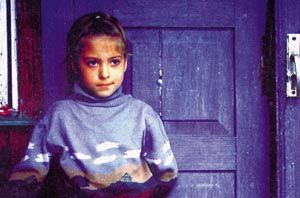 
|
|
|
|

|
 |
 |
Hawaii International Film Festival
The Hawaii International Film Festival doesn’t want to be just another pretty face. While other domestic American independent festivals in the Fall are giving the last rites to some undistributables from the Sundance-Cannes-Toronto runoff – and many times programming a miserable event — the HIFF sticks mostly to the Pacific Rim and to its warm and fuzzy mission statement of promoting cultural understanding among the state’s entire population. Festival Director Christian Gaines chooses films from a deep well that includes Japan, Taiwan, China, the Philippines, Australia, and New Zealand – a program refreshingly lacking in American indies. HIFF has grown to become one of the most important Asian festivals in the U.S. As a former Sundance programmer, Gaines approaches his job with a unique understanding that the program slate changes the festival's profile annually. And though many believe HIFF seems a perfect place for an Asian-oriented film market, his years in Park City have taken away the romance of a first run market fest.
 |
| Motohashi Seeichi's Nadya's Village. |
This year the festival's mission included a unfortunate caveat. Paul Wagner's Windhorse, a story of the torture of Tibetan nuns shot clandestine in Tibet and Katmandu, was invited to compete after screening in Toronto. When the Chinese government threatened to pull its sponsored slate of six Chinese films, HIFF dropped Windhorse from the competition. Wagner, in protest, pulled the film completely. As the trades buzzed in the weeks to follow, and after Wagner felt that the message was heard, an agreement was reached to allow the film in a non-competitive sidebar. Why the festival took such an obvious turn into a PR nightmare is unclear, but in a strong, unusual speech before the screening Gaines honorably accepted the blame, admitting he had made a mistake when forced to make a difficult decision.
Gala presentations in the beautifully restored Hawaii Theater screened to large Asian crowds. Opening the festival was actress Joan Chen’s directorial debut Xui Xui-The Sent-Down Girl, a harrowing story of a young Chinese girl lost in the Cultural Revolution’s "People’s Education" program. The gala presentation of Jule Gilfillan’s lukewarm romantic comedy Restless, about an American woman’s transparent romantic complications in modern China, provoked some pointed comments. "The Chinese community in the film seems to treat her so respectfully. Do you think a person from China would be treated as respectfully in an American city?" Gilfillan agreed they probably wouldn’t while her producer worked to steer the conversation in another direction. Yet it was a better reception than the next day’s screening of Abel Ferrara’s New Rose Hotel starring Christopher Walken and Willem Dafoe as operatives for a global corporation in charge of luring a renowned scientist to their employer. The audience was unfortunately impatient and unforgiving with Ferrara’s non-linear narrative experiment.
Gems from the comedy sidebar were Robert Meyer Burnett’s Free Enterprise co-starring William Shatner as himself; he enlists the help of two independent filmmakers in his crazed quest to produce a musical "Julius Caesar" in which he plays all the parts. Koki Mitani’s Welcome Back Mr. McDonald, adapted from his radio play, rewrote the American screwball comedy into a Chinese radio studio as a cast of egomaniacs and primadonnas attempt to put on a live drama. The film’s water-tight script and skilled ensemble cast, classic comic timing and situations translated easily despite culture and language barriers. In the "Australasia" section, Juliet Darling’s fantastic doc Dead Letters documents the present day dead letter office in Australia, where faithful employees wade through and read mounds of unreturnables including Dear John letters, notes to God and Santa, pornography, and countless dead animals mailed as threats.
The jury did the best they could with only five nominated films in each of the dramatic and doc categories. With an unusual statement at the awards ceremony, they collectively bemoaned the dismal selection. The Golden Maile for Best Feature went to Kwang Mo Lee's Spring in My Hometown, a studied, patient story that mixes Korea's turbulent history into the drama of a small village. Compared to the rest of the nominations, it was the clear choice as was the winner in the doc category, Motohashi Seeichi's Nadya's Village — another equally slow meditation on the villagers that remain in Dudichi, a small village in the Republic of Belarus that was evacuated following the Chernobyl disaster.
Despite the award nominations, HIFF gives enough reasons to stay in the cold, dark theater away from the surf and sand. Its programming remains clear and focused. HIFF continues to take its films on the road – from the main screenings in Oahu to the more rural neighbor islands where in the previous years admission has been free. Gaines is affectionately referred to as "the Haole that made everyone pay," but money hasn’t influenced a more commercial program. He continues to encourage and applaud "Hawaiian" filmmaking and exhibiting among the tiny cluster of islands which have a very large job of serving as a convergence of cultural influences stretching the Pacific. From the program’s perspective it is utterly secondary that the point of convergence is a tropical tourist paradise.
-
Venice International Film Festival by Belle Burke
Toronto International Film Festival by Ray Pride
Marco Island Film Festival by Brandon Judell
Fort Lauderdale International Film Festival by Stephen Gallagher
Tacoma Film Festival by Liane Bonin
International Film Festival, Mannheim-Heidelberg by Diane Sippl
Hawaii International Film Festival by Mike Jones
London Film Festival by Laura Macdonald
Shorts International Film Festival by Amy Veltman
CinemaTexas by Holly Willis
back to top
home page | subscribe | merchandise | history | order form | advertise | contact
archives | links | search
© 2005 Filmmaker Magazine